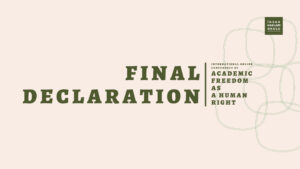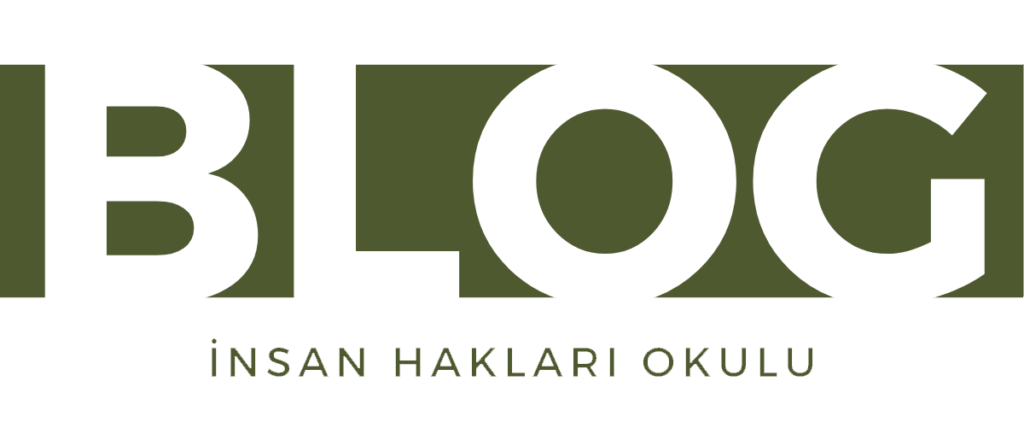ACADEMIC Freedom as HUMAN RIGHT
International Online Conference
14-15-16 December 2020
This conference was prepared within the scope of the project "Bringing the Human Rights Academy to Civil Society" funded by the European Union. The content of it does not reflect the official opinion of the European Union.
Final Declaration
 İnsan Hakları Okulu (The School of Human Rights, or İHO) has had two targets since its inception. While the first has been to create an alternative academic space, the second has been to set in motion an intellectual discussion of the conceptualization of academic freedom as a human right. For the first target, 20 free online workshops have been conducted. In order to realize the second target, to expose the necessity of discussing academic freedom in terms of human rights literature and the negative effects of the state of exception on academic life in Turkey, IHO has focused on field work. Accordingly, IHO has brought together human rights experts and members of civil society by means of summer and winter schools, seminars, working sheets and YouTube broadcasts, in order to close the gap caused by the circumstances of the state of exception in the field of human rights.
İnsan Hakları Okulu (The School of Human Rights, or İHO) has had two targets since its inception. While the first has been to create an alternative academic space, the second has been to set in motion an intellectual discussion of the conceptualization of academic freedom as a human right. For the first target, 20 free online workshops have been conducted. In order to realize the second target, to expose the necessity of discussing academic freedom in terms of human rights literature and the negative effects of the state of exception on academic life in Turkey, IHO has focused on field work. Accordingly, IHO has brought together human rights experts and members of civil society by means of summer and winter schools, seminars, working sheets and YouTube broadcasts, in order to close the gap caused by the circumstances of the state of exception in the field of human rights.
The International Online Conference of Academic Freedom as a Human Right, which took place on 14-16 December 2020, was designed as a platform to further the understanding, for an international public, of academic freedom as a human right. The following topics were discussed in details during the conference: the definition of academic freedom, the specific historical background of debates on academic freedom in Turkey, the current situation and the violations of human rights in the state of exception and in other authoritarian regimes around the world. Including several cases from across the world, it aimed to explore a variety of ideological discourses and tools in the hands of authoritarian regimes, and to dispute the relation between academic freedom and the literature on human rights.
In the case of Turkey, academic freedom has largely been understood in terms of the working field of academics, as well as their targets of critique and political impact since the 1960s, when the academy emerged onto the scene of politics as the carrier of cultural hegemony. In such a context, the claim for academic freedom has either been positioned as a privilege (and the necessity to not give up this privilege became the priority), or it has been discussed solely in terms of freedom of expression, at the expense of dismissing the particular dynamics of academic freedom. The blind spot of the ‘academic freedom as a privilege’ approach, which excludes academy from the social body, is distancing academic freedom from other collective rights at the expense of dismissing the academy as an element of public space. However, as in the case of freedom of the press, when the violation of that precise right not only affects journalists but also the social structure at large, discussions of academic freedom cannot be limited to academics and universities.
As clearly put in the 1997 UNESCO advisory jurisdiction, academic freedom should be recognized as a right that concerns not only academics, but also a public, consisting of students and an administrative environment, and that functions as the guarantor of the existence of basic human rights. The violation of academic freedom affects several fields, such as finances and health, through limitations to the production, sharing, and accessing of information. Expanding upon the public value of academic freedom, such an approach posits the necessity of recognizing academic freedom as a human right.
During the conference, the coverage of the cases in Turkey, France, the USA, India, Hungary and China exposed both the direct relation between academic freedom and human rights, and the public impact and reflections of the violation of academic freedom. While censorship and auto-censorship prevent the academy from supporting discussions concerning public space, university centers dealing with human rights and gender studies have been the first two targets of authoritarian regimes in order to legitimize the oppression of the academy, through the promotion of national values and interests.
Academic freedom should be considered as a duty as much as a human right. Academic freedom as a tool for defending basic human rights is an effective means to implement scientific knowledge in public space, and to prevent human rights violations. In line with such an understanding, positing academics as speaking agents of history rather than privileged subjects contributes to the empowerment of civil society by its very intellectual stance, and to the solution of social obstacles in the name of peace and well-being. Yet, it is also crucial to keep in mind the risk of reproducing similar structural problems within alternative initiatives by missing the recognition of those problems. Recognizing academic freedom as a human right is in the service of the implementation of basic human rights to the social body, through the freedom of expression and critique of the agents of the academic environment.
Another issue raised during the International Conference of Academic Freedom as a Human Right was the emergence of the university as a component of the free market. This focus was addressed not only through the emergence and development of the concept of academic freedom, but also as a barrier to the circulation of academic knowledge in public space, and the right to access knowledge. Despite the need for academic knowledge to circulate in public spaces, and for no other limits than the limits of academic freedom for any academic research in pursuit of truth, we witness the monopolization of information in the hands of the market and the state under authoritarian regimes, which re-organize the academy around the values and interests of corresponding governments. In this respect, the examples on the weakening of public universities and their re-arrangement in harmony with market conditions address privatization as one of the main agents in the erosion of the academy’s public resonance.
For İHO, this conference marks not a conclusion, but a beginning for further discussions on academic freedom as a human right. İHO will continue to deepen this discussion while pursuing violations of academic freedom. Accordingly, it will continue to produce alternatives for the gap between the academy and public space on the basis of principles of critical thought and academic freedom.
